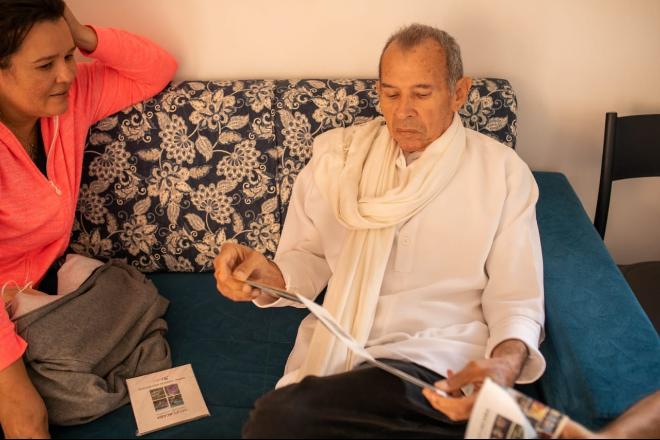In a report from the newspaper Correio do Estado, from Mato Grosso do Sulto neurocirurgiã e fundadora da WeCann Academy, Patricia Montagner, ressalta o potencial da cannabis medicinal para variados tipos de doenças, beneficiando inúmeras pessoas que buscam incansavelmente por alternativas que lhes reduza o sofrimento, proporcione uma vida melhor e que, com base em evidências científicas, têm nessa terapêutica uma aliada ao tratamento.
Read the full text on the Correio do Estado or below:
Cannabidiol oil improves the well-being of patients with diseases such as dementia, Parkinson’s and fibromyalgia
Substance extracted from the cannabis plant, popularly known as marijuana, enables a significant improvement in the treatment of several pathologies
Surrounded by taboos, the use of cannabidiol as medicine in the treatment of numerous diseases has grown in Brazil, including Mato Grosso do Sul. The substance extracted from the cannabis plant, popularly known as marijuana, enables a significant improvement in the treatment of pathologies such as Parkinson’s, Alzheimer’s, autism, epilepsy and multiple sclerosis.
Thanks to cannabidiol oil, the musician Francisco Saturnino Lacerda Filho, from Acaba Group, known as Chico, had a few moments of tranquility with his family before the mixed dementia, vascular with parkinsonian, hit him again. “We started using the oil four months ago, when my father started to enter the severe phase of dementia. He has mixed dementia, vascular with parkinsonian. The medicines were no longer controlling the disease nor having the desired effect”, explains Francisco’s daughter, Carina Cury Lacerda. “It took about 15 days to reach the ideal dosing, and soon we started to see improvement. From a catatonic condition, he started to smile, have interactions, even if meaningless and often delusional, remember old habits, have his own wills and make brain synapses”, she details.
At 76 year old, Francisco is now fighting the disease again, which has evolved rapidly in the last month. “Today he is in a different situation; he is entering the severe phase of the disease, with infection and other intestinal problems. We live with the problems of the disease and the weakened body, however, what cannabidiol oil has brought us and brings us are moments of joy and pleasure, both for us as relatives and for the patient”, the daughter says.
Carina managed to acquire the oil by means of a work carried out by the Associação Sul-Mato-Grossense de Pesquisa e Apoio à Cannabis Medicinal Divina Flor [Divina Flor Mato Grosso do Sul Association for Research and Support for Medicinal Cannabis], which makes the substance available to Mato Grosso do Sul patients. According to one of the association’s directors, Alexander Onça, the idea of creating the initiative arose in 2019, when he and a friend, also director Jessica Luana Camargo, were prescribed with cannabidiol. “We are both patients, I have Tourette’s Syndrome, diagnosed 4 years ago, and my neurologist prescribed the oil. We realized how difficult and expensive it was to import it; the cost of the oil is, on average, R$ 2,500 at drug stores”, he says.

After several attempts to acquire the product, both of them discovered that there were several associations of this kind in Brazil and participated in a course in São Paulo to increase knowledge on the subject. “That was in 2019. We took a course by the Sociedade Brasileira de Estudo da Cannabis Sativa (SBEC), made up by physicians, psychiatrists, neurologists, serious people, and within the city hall of São Paulo. It was pretty advanced, and we found several physicians supporting us here. Through the association, we get oils for patients at a lower cost, depending on the dosage. About 20% are also for free donation, that is, people who receive the oil free of charge when they cannot afford the costs”, he points out.
For the time being, the association is fighting for the right to cultivate the plant in Mato Grosso do Sul. “Our authorization is under process with the Federal Court, in the name of the association, in addition, we help patients to obtain the medicine in other associations”, he explains. For Carina, the oil has made a difference in her family’s life in recent months. “I hope that everyone who has the same problem, or others, such as autistic patients, cancer patients, etc., may have the opportunity to take the oil”, she emphasizes.
Who also saw benefits was Fabiana Rodrigues, 36, mother of little Lara Gabriel de Souza Rodrigues, only five years old, who has cerebral palsy and epilepsy hard to control. “She has been taking it for almost two years and it has changed a lot, the spasms she had at high frequency have diminished. It’s been a year since I started to buy the oil by means of the association; I used to buy it from another place that had a much higher price. The association’s staff gave me a lot of support, in view of what I paid before”, he points out.
Science
Advances in the use of cannabidiol in Brazil are supported by science and by doctors, who have been prescribing this substance more each time.
However, according to the neurosurgeon physician Patrícia Montagner, it was not always like this. “I graduated, did my medical specialization and never had access to this knowledge in academic environment, never heard of the endocannabinoid system, never had a class showing that this plant, cannabis, could have therapeutic potential in treatment. What happened is that, after I studied medicine and neurosurgery, I started to see many patients with chronic pain, patients with different neurological disorders, who did not show satisfactory results from usual therapies”, she explains.
Patrícia is one of the physicians advocating the use of cannabidiol in the treatment of several diseases, and she noticed an increase in the interest of patients for the treatment during the pandemic. Currently, she prescribes the oil for people living with chronic pain and degenerative neurological diseases, such as Parkinson’s, Alzheimer’s, epilepsy, multiple sclerosis and fibromyalgia. “We observe dramatic responses in people with fibromyalgia who have been suffering from pain for 15, 20 years, trying to improve with various medications, such as antidepressants, anticonvulsants, sedatives, shortly, several analgesics, and who did not present satisfactory responses and, when supplemented [with cannabidiol], showed an excellent response in terms of controlling pain, fatigue and associated symptoms”, she comments.
According to her, there is still a lot to be investigated about cannabis. “There is a lot of science to explain why the plant works for different health problems. The plant has been explored for therapeutic purposes for thousands of years, this is nothing new, pharmacopeial and medical treatises have already referred to the potential of this plant. The novelty lies on discovering how and why the plant works”, she explains.
Graduated from the Federal University of Mato Grosso do Sul (UFMS), psychiatrist Wilson Lessa is also an advocate of medicinal cannabis in Brazil, and not just from the cannabidiol point of view. According to Wilson, research on cannabis dates back to the 1980s. “Today, among psychiatric diseases that have some possibility of treatment with cannabinoids, and not necessarily cannabidiol alone, but mainly it, we have autism, neurodegenerative diseases, such as Parkinson’s, Alzheimer’s and schizophrenia, with excellent results”, he points out.
According to him, improvements were observed in the treatment of anxiety and Tourette’s Syndrome, in this case by using tetrahydrocannabinol (THC), a substance also found in marijuana. “There are difficulties in conducting scientific studies, since the plant is prohibited, but over the next five years we will see many other relevant studies, with good scientific evidence. We are only seeing the tip of the iceberg”, he believes.
Source: Correio do Estado
Date: 23 de agosto de 2021
